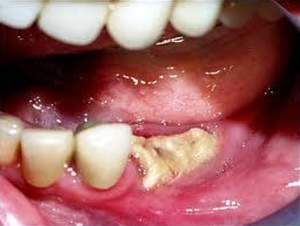Osteonecrosis of the jaw (ONJ)
The following information is taken from the National Osteoporosis Society’s Drug Treatments leaflet.

There is some information suggesting a link between drugs from the bisphosphonate family and a condition called osteonecrosis of the jaw.
This is a rare condition and seems to be mostly associated with very high doses of bisphosphonate drugs given intravenously (via a needle into a vein) for cancer.
Osteonecrosis means that some of the cells die in the affected bone, and in the jaw this could mean delayed healing and problems if major dental work was carried out. Osteonecrosis linked to tablet bisphosphonates such as alendronic acid or alendronate (Fosamax) is very unlikely to occur. The risk may be slightly higher for people using the intravenous bisphosphonates for osteoporosis such as zoledronic acid (Aclasta) and ibandronate (Bonviva).
There have been only a small number of cases described worldwide, so the risk associated with the osteoporosis treatments is extremely low. The Medicines and Healthcare Products Regulatory Agency (MHRA) have stated that the majority of reported cases have been associated with dental procedures such as tooth extraction and many had signs of local infection. Therefore, a dental examination should be considered prior to treatment with bisphosphonates in those patients who have other risk factors (such as poor oral hygiene, cancer, chemotherapy or corticosteroids).
The MHRA have also stated that whilst on treatment with bisphosphonates, patients with these other risk factors should avoid invasive dental procedures if at all possible. There is no research available yet to suggest that stopping a bisphosphonate for those people who are already on them will in any way reduce the risk of ONJ if they need to have dental work done. It is obviously difficult for the many people who have been on bisphosphonates for osteoporosis for several years and who need dental procedures. They will need to have discussions with their dentist, although without any of the risk factors listed above it should be possible to go ahead with dental work without any significant concerns. In fact routine care by a dental professional would be recommended.
In September 2008 the BDA (British Dental Association) produced some guidance for dentists which reflects this. This guidance provides clear recommendations regarding the management of people taking a bisphosphonate for osteoporosis should they require dental procedures such as extractions or crowns.



